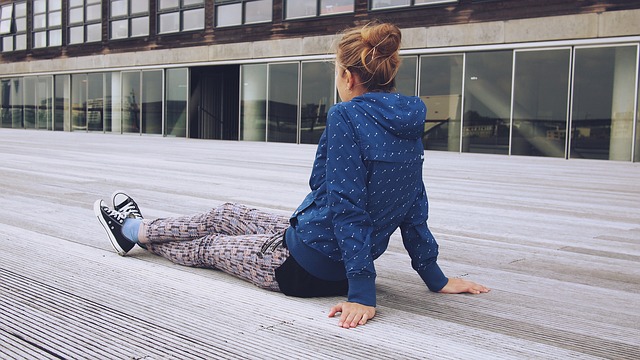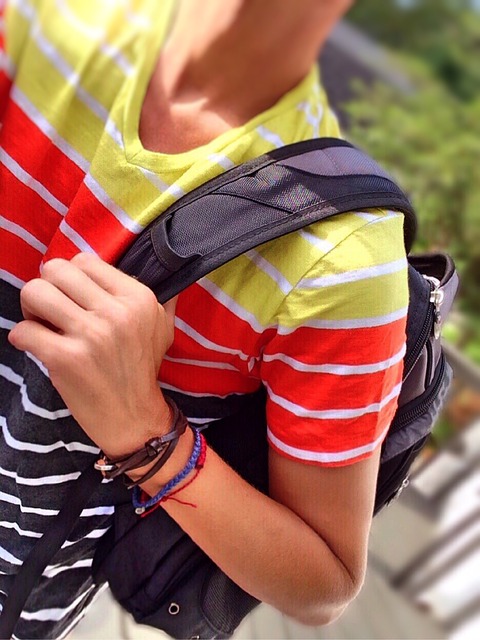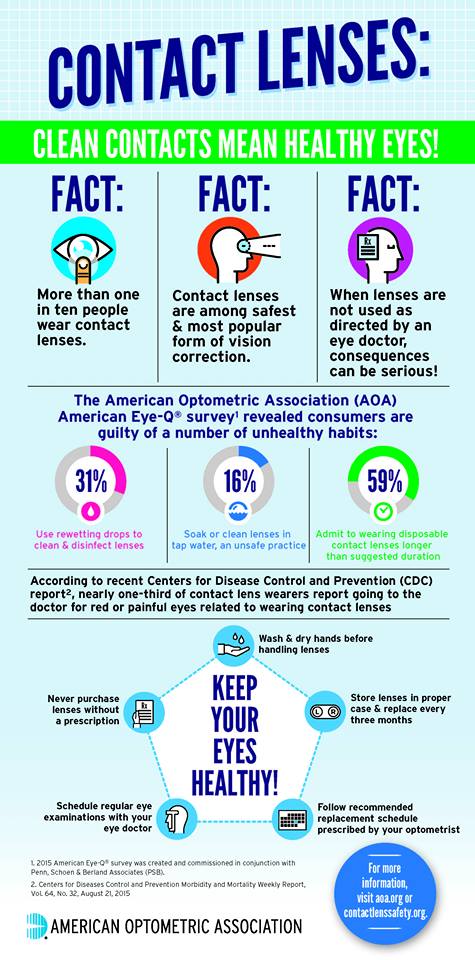
I remember getting my first pair of glasses in junior high school. Not long after I got glass, I was begging my mom to get me contacts. She was a bit hesitant to get them for me at first because they do require a bit more care and maintenance, especially back then. I started playing soccer and didn’t like wearing my glasses on the field. I didn’t want the ball to hit me in the face and break my glasses. Ouch!
So one day my mom finally decided to get me contacts. I was so excited because I had been dreaming of the moment where I could see without wearing glasses. My mom took me to the eye doctor and had my eyes examined for contacts. Your eye doctor will require a special eye exam prior to fitting you for contacts. Your prescription is a bit different than it is with glasses.
If your tween or teenager is trying to talk you into getting contacts, it might be time to have a talk about the responsibilities involved in caring for contact lens. There is not a right age for your child to be to get fitted for contact lens. Instead, you should base your decision on your child’s maturity level and how responsible your child is with their other belongings and chores.
Contacts Aren’t Considered a Fashion Statement
Contacts shouldn’t be worn as a fashion statement. They are considered a medical device and should be treated with caution. Teenagers are concerned with their looks and often times they would rather not wear their glasses so that they aren’t teased(it hasn’t happened to any of my kids). They do make colored or fun looking contacts that you can buy without a prescription.
Identifying the Need for Contacts
Even if your child currently wears glasses, you will need to have your child’s eye examined again to determine if contacts would be beneficial. Contacts have come a long way over the years and can treat a variety of vision problems. Always follow the advice of your optometrist to determine the right brand and type of contacts for your child.
Always Wash Your Hands Before Touching the Contacts
Always wash your hands before touching your contacts using a mild soap that doesn’t contain any perfumes, oils, or lotion. Ask your eye care professional which soap that they recommend for washing your hands if you are unsure. Washing your hands with the wrong type of soap could cause eye irritation or blurry vision if some of the chemicals are transferred to the contact lens.
Use a Clean, Lint Free Towel
Dry your hands with a clean, lint free towel. A small speck of lint can transfer from your hands to your contacts. All it takes is a small speck of lint to make wearing your contacts uncomfortable.
Keep Nails Short
I remember trying to grow out my nails and let me tell you that putting in contacts with long nails isn’t an easy feat. It is best to keep your nails short and trimmed to avoid accidentally scratching your eye or the lens. Don’t forget to keep underneath your nails clean too. Your fingernails are a dirt and germ magnet.
Practice Makes Perfect
It can be a challenge to put contact lens in your eye. Your body’s natural instinct is to close your eye to prevent a foreign object from getting into your eye. Your eye care professional will help show you how to properly put your contacts in and how to take them out. It will get easier to take them out and put them in as you get the hang of it. Don’t let this prevent you from wearing them.
Ladies Put the Make Up on After You Put in the Contact Lens
If your teenage daughter is starting to wear makeup, she needs to put in her contacts before putting on any makeup. This will keep any make up or debris from getting into her eye as she is trying to put in her contact. Also, now is a great time to make sure that she knows the importance of knowing when to toss her make up too. It is possible to transfer germs from old make up to her eye especially eye shadow and eye liners.
Never Wear Contacts if Your Eyes are Irritated or Infected
I suffer from horrible allergies and if I found that my eyes were irritated already, wearing my contacts wasn’t a good idea. If your child suffers from allergies, talk to your eye care professional before determining if your child is suitable to wear contacts. They may be able to help reduce your child’s allergies. Also, if you suspect that your child is getting pink eye, you want to avoid wearing your contacts until the infection has cleared up. Don’t ever wear the same contacts that you were wearing when you had the infection without thoroughly cleaning them (your health care provider should explain this to you if not ask) or putting in a new pair.
Avoid Touching Anything with the Contact Solution Tip
It is super important that you use extreme caution when using your contact lens solution. You never want to touch the tip of the bottle to anything, including your lens, case, or finger. If the tip of the bottle touches something, you can easily contaminate the solution. Contamination could cause a potential eye infection.
Always Keep a Contact Lens Case and Solution with You
Photo Credit: Pixabay
Once your child starts wearing their contacts to school, they will need to make sure that they keep a case, contact lens solution, and their glasses in their backpack or locker. You never know when you might need to remove your contacts and it would not be fun being without your supplies. Never use plain water or put the contacts in your mouth. You can easily transfer microscopic bacteria to your eye.
Clean Your Contact Lens Case Daily
Depending on the type of contact lens that your optometrist has picked out for you, you need to clean your contact lens case out daily. Rinse it out with sterile solution, if possible let it air dry, before adding more solution. Make sure that you replace your case every three months.
Never Share Contact Lens
Never ever share your contacts with anyone. They were prescribed for your vision and they were meant to be worn by one person only.
Don’t Sleep in Your Contacts
It is not wise to sleep in your contacts unless your optometrist has given you special lens. Most contact lens are made for daily wear only. Falling asleep in your contacts can restrict the amount of oxygen from getting to your eye while you are sleeping. Closed eyes don’t allow the tears to deliver the right amounts of oxygen to your eye.
Never Wear Contacts Underwater
The American Optometic Association (AOA) suggests that you remove your contact lenses before exposing them to water. You should never swim with your contact lens on even if you are using goggles.
Do Wear Sunglasses
Wearing contacts may increase your sensitivity to the sun. Make sure that you are wearing sun glasses to help protect your eyes from the sun’s harmful UV rays.
If your tween or teenager wants contacts, it is super important that you talk to them about their eye health. Contact lens have changed drastically over the years and they do help make you see better than with glasses. I always loved how crisp and clear my vision was when I wore my contacts. Contacts are covered under some vision plans but if not there are affordable options available. I highly suggest that you order contacts from a reputable vision expert and not off the Internet from an unknown/unreliable source.
More Information about Purchasing Contact Lens
Optometrists are increasingly concerned about the illegal sale and use of decorative or non-corrective contact lenses, which are still classified as medical devices and pose the same potential safety and health risks as corrective contact lenses.
- Often times, decorative contact lenses are acquired illegally – through street vendors, flea markets, or beauty supply stores – without an eye doctor’s prescription and guidance.
- When purchased illegally, these contact lenses often don’t meet quality and safety standards set by the U.S. Food and Drug Administration, which is a major concern for optometrists.
- These lenses are not merely a fashion or costume accessory, decorative contact lens wearers who don’t follow the guidelines for use and wear can experience symptoms such as blurred or fuzzy vision; red or irritated eyes; pain in and around the eyes or, a more serious condition where the cornea becomes inflamed, also known as keratitis. These problems can lead to significant damage to the eye’s ability to function, and even irreversible sight loss.
Visit the AOA to learn more about contact lens and answer any additional questions that you might have.
Photo Credit: Pixabay
I was selected for this opportunity as a member of Clever Girls and the content and opinions expressed here are all my own.


Comments
6 responses to “15 Things to Consider When Your Tween or Teenager Wants Contact Lens #AOAhealthyeyes”
I’ve worn glasses for the longest time. I don’t think I’ve ever tried wearing contact lenses. But these are awesome tips, not only for teens!
Great tips It helps a lot of people out Thank you so much.
Great tips It helps a lot of people out Thank you so much.
These are some great tips! I have been wearing glasses since the first grade and have never tried switching to contacts, mostly because of the ick factor of touching the contacts, my eyes, and with my luck giving myself some sort of eye infection through cross-contamination. I’m also paranoid, which you could have probably guessed.
I’ve been wearing glasses since 2nd grade and contacts since I was 15 and I can’t ever imagine every going back to glasses full time! You made some good points about contacts!
These are some great things to coincider! I was so scared of contacts when I was a kid! So silly of me lol